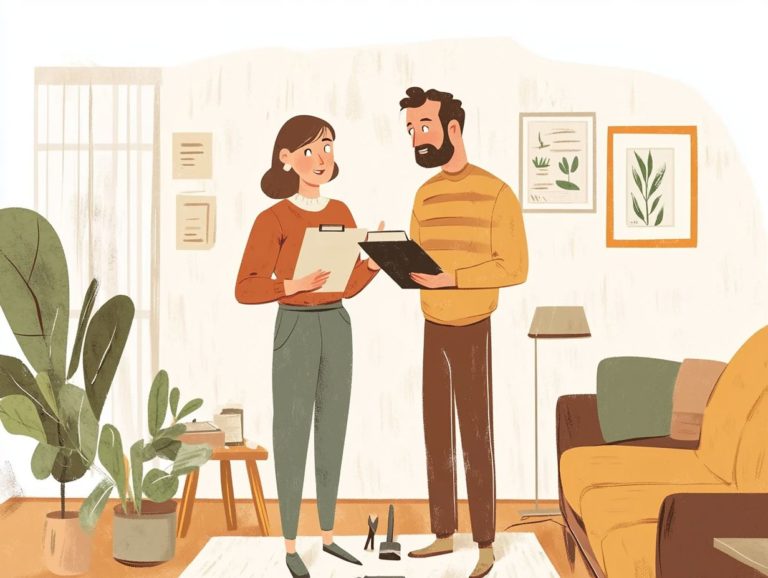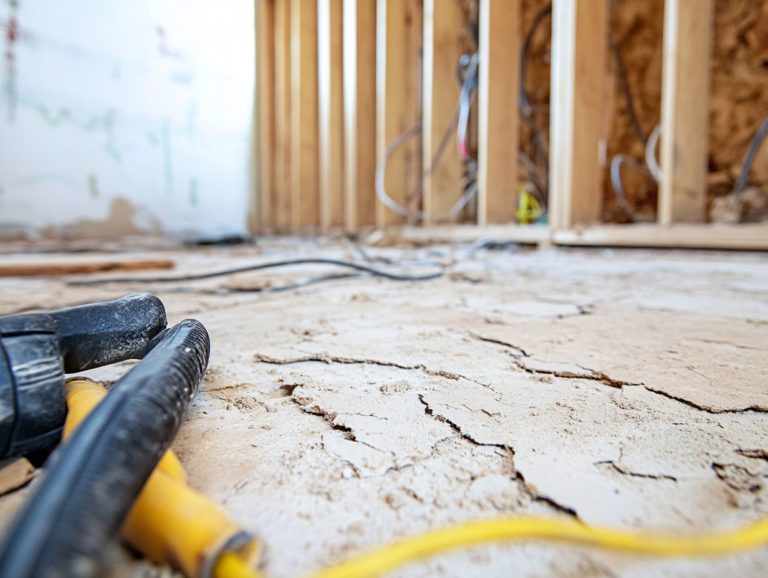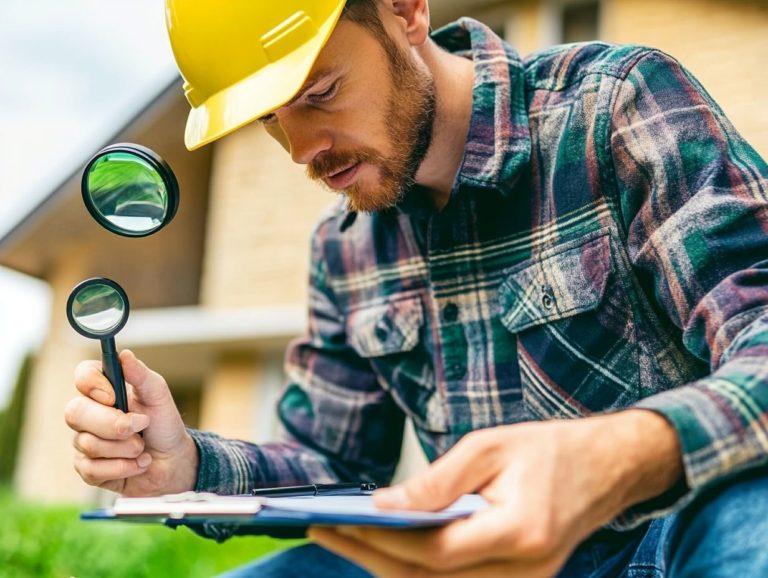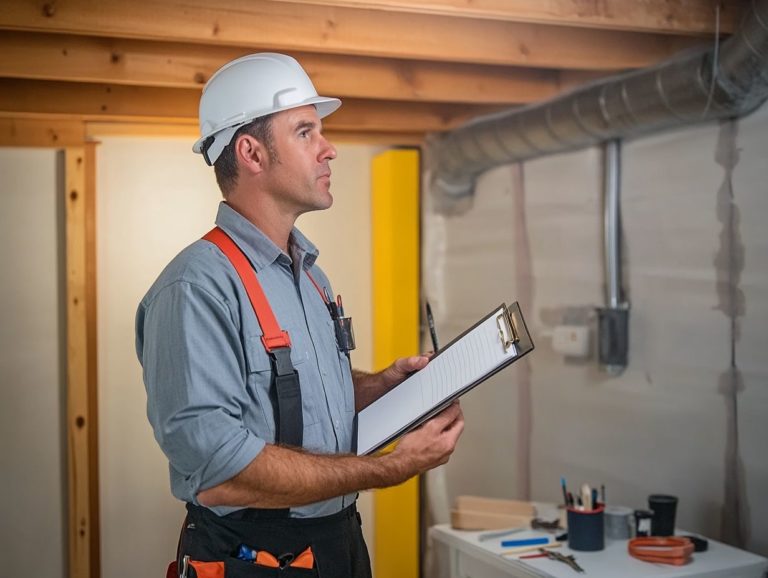How to Choose the Best Home Inspector for Your Needs
When you buy a home, its condition is crucial. That s where a home inspector comes in.
This guide enlightens you on the essential role a home inspector plays and what to expect during an inspection. It will also highlight the traits of exceptional inspectors.
It addresses essential questions to ask, offers tips for researching potential candidates, outlines cost considerations, and emphasizes why investing in a thorough home inspection can save you from future headaches.
Don t wait! Empower yourself with this knowledge and make an informed decision today!
Contents
- Key Takeaways:
- Understanding the Role of a Home Inspector
- Qualities to Look for in a Home Inspector
- Questions to Ask When Choosing a Home Inspector
- Researching and Comparing Home Inspectors
- Factors That Affect the Cost of a Home Inspection
- The Importance of a Quality Home Inspection
- Frequently Asked Questions
- What should I look for in a home inspector?
- How do I know if a home inspector is certified?
- Can I ask for references or reviews from previous clients?
- Should I choose a home inspector based on price alone?
- Is it necessary to attend the home inspection?
- What should I do if the home inspector finds issues with the property?
Key Takeaways:

Choose an experienced home inspector with relevant certifications. This investment can save you time, money, and stress later.
Understanding the Role of a Home Inspector
A home inspector plays an essential role in your home buying journey by delivering an objective assessment of a property’s condition. They identify potential hidden issues that could impact the value, safety, and livability of your future home.
This comprehensive inspection examines various aspects, including structural concerns, mechanical issues, and safety hazards. This knowledge gives you the power to negotiate the sale price effectively.
Home inspectors meet certification standards established by respected professional associations, such as the American Society of Home Inspectors and the International Association of Certified Home Inspectors.
What to Expect from a Home Inspection
During a home inspection, you can expect a thorough evaluation conducted by a qualified home inspector. They will provide a detailed report of any issues discovered.
This investigation typically covers major areas such as the roof, plumbing, electrical systems, and heating and cooling systems, offering you a clear understanding of the home s overall condition.
Lasting around two to three hours, the inspection process allows inspectors to meticulously examine each component for safety and functionality.
Sometimes, you might be advised to conduct additional tests, like air quality assessments, to ensure the home meets health standards.
After the inspection, reviewing sample reports is essential, as they help you understand the findings and identify potential risks or maintenance needs.
Qualities to Look for in a Home Inspector
When choosing a home inspector, seek someone trustworthy, armed with the right experience and certifications. For guidance, check out this resource on how to select a home inspector for your needs. This ensures they can perform a comprehensive inspection that meets industry standards and provide invaluable insights as a homebuyer.
Experience and Certifications
The experience and certifications of a home inspector are crucial for ensuring a reliable inspection. Certifications from esteemed professional associations indicate expertise.
These credentials require candidates to complete rigorous training programs covering essential areas such as structural elements, plumbing, electrical systems, and safety protocols. Many inspectors must also conduct a specified number of hands-on inspections under mentorship before they can claim certification.
Ongoing education is vital to maintain their qualifications. This continuous learning keeps them informed about new building codes and advancements in the industry.
Ultimately, possessing such credentials boosts the inspector’s credibility and trustworthiness. This offers you greater peace of mind throughout the home-buying journey.
Attention to Detail and Thoroughness

A good inspection depends on your inspector’s keen eye for detail. This enables them to uncover hidden issues related to structural integrity and mechanical systems that could become significant headaches for you as a prospective homebuyer.
Take HVAC systems, for example. They can conceal inefficiencies that might inflate your energy bills if not properly assessed. Similarly, faulty plumbing could be lurking behind walls, posing a risk of severe water damage down the line.
Electrical systems deserve your attention, too. Outdated wiring can create safety hazards that often go unnoticed. By carefully checking these components, the inspector can reveal common hidden problems such as:
- Rusted pipes
- Circuit overloads
- Improperly vented systems
This proactive approach not only helps you avoid costly repairs but also ensures peace of mind as you navigate your homebuying journey. Ultimately, this diligence protects your financial investment and enhances the overall safety and livability of your future home.
Questions to Ask When Choosing a Home Inspector
When selecting a home inspector, asking the right questions is key to evaluating their expertise and reliability, especially if you want to understand how to choose the right inspector for your home.
This ensures you receive a thorough inspection report tailored to your needs while giving you a clear understanding of the associated home inspection costs.
Important Inquiries to Make
When hiring a home inspector, it’s essential to ask the right questions about their experience, certifications, and what their inspection report will entail. Understanding how to choose the right inspector for your property is vital, as the choice of inspector can significantly influence your home-buying journey.
Ensure that the inspector has a level of experience that reflects a deep understanding of various home systems and potential trouble spots. A credible inspector should possess relevant certifications from reputable organizations, guaranteeing adherence to industry standards.
Anticipate a thorough inspection report that includes detailed descriptions, photographs, and clear assessments of the property’s condition. Be alert for red flags, such as vague answers about their expertise or hesitance to provide references; these could hint at a lack of professionalism or knowledge that you certainly don t want in your corner.
Researching and Comparing Home Inspectors
Researching and comparing home inspectors is an essential step in your home buying journey. It gives you the power to select a qualified professional capable of delivering an accurate assessment of the property, which is why knowing how to choose the right home inspector for your property is crucial.
This process is often enhanced by seeking agent referrals or consulting reviews from reputable sources, such as the Better Business Bureau, ensuring you make an informed decision.
How to Find and Evaluate Potential Inspectors
To find and evaluate potential home inspectors, consider a blend of online research, personal recommendations, and a thorough vetting process for qualifications and reviews. For more guidance, check out how to choose the right home inspector for you. This approach not only streamlines your selection process but also gives you the power to make informed decisions.
Start by utilizing platforms like Yelp or Angie’s List, where you can access genuine feedback from previous clients. Additionally, consider looking into how to compare home inspection services as connecting with real estate agents can also be incredibly beneficial, as they often have reliable recommendations from inspectors they trust.
Once you’ve compiled your list, it’s essential to assess each inspector’s credentials by visiting their websites. For guidance, check out how to spot a good home inspector. Look for relevant certifications and experience that align with your expectations.
Delving into online reviews can provide valuable insights into aspects like punctuality, thoroughness, and communication skills, helping you choose an inspector by learning how to find a qualified home inspector who fits your specific needs perfectly.
Factors That Affect the Cost of a Home Inspection

Understanding the factors that influence the cost of a home inspection is crucial for you as a homebuyer to budget effectively.
Various elements, including the property’s condition, any additional tests such as radon or lead testing and the inspection’s location can all significantly affect the final price.
Being aware of these factors allows you to make informed decisions and allocate your resources wisely.
Understanding Pricing and What’s Included
Understanding the cost of a home inspection is essential. It helps you grasp what pricing includes and what a typical inspection report contains.
By breaking down the pricing structure, you can gain valuable insights into the various services offered. Generally, inspections cover crucial components like:
- the condition of the roof
- plumbing
- electrical systems
- major appliances
The cost can vary significantly based on what the inspection covers and the expertise of the provider. Some professionals may charge a flat fee, while others might base their fees on the square footage of your home or the complexity of the inspection.
It’s important to recognize that variations in pricing can influence the level of detail presented in the inspection reports, ultimately guiding your purchasing choices.
The Importance of a Quality Home Inspection
A thorough home inspection is essential in your home buying journey. It reveals hidden issues that could impact the property’s value, giving you the power to negotiate the sale price more effectively based on the inspector’s insights.
Why It’s Worth Investing In
Investing in a thorough home inspection is a wise choice for homebuyers! It offers peace of mind and potentially saves you from unexpected repair costs or structural issues down the line.
A meticulous inspection can uncover hidden problems that aren t immediately obvious, such as plumbing or electrical issues, which can lead to substantial expenses if ignored. By addressing these concerns early, you not only avoid inflated repair bills later but also enhance the overall value of your property.
Statistics show that homes with inspections typically sell for about 15% more than those without. This resonates with countless homeowners who have shared their positive experiences, emphasizing that the initial investment in a home inspection truly pays off as you navigate your homeownership journey.
Frequently Asked Questions
What should I look for in a home inspector?

When choosing a home inspector, it is important to look for someone who is experienced, knowledgeable, and certified. For guidance on this process, check out tips on how to choose the right inspector for your needs. You should also consider their reputation, communication skills, and availability.
How do I know if a home inspector is certified?
A certified home inspector should have a license and be a member of a professional organization, such as the International Association of Certified Home Inspectors (InterNACHI) or the American Society of Home Inspectors (ASHI).
Can I ask for references or reviews from previous clients?
Yes, it is recommended to ask for references or read reviews from previous clients to get an idea of the home inspector’s work quality and customer satisfaction.
Should I choose a home inspector based on price alone?
No, it is not recommended to choose a home inspector based on price alone. It is important to consider their qualifications and experience, as well as the services they offer.
Is it necessary to attend the home inspection?
While it is not necessary, it is highly recommended to attend the home inspection. This will give you the opportunity to ask questions and get a better understanding of the inspector’s findings.
What should I do if the home inspector finds issues with the property?
If the home inspector finds any issues, it is important to discuss them with the inspector and ask for their recommendations. You may also want to get a second opinion or consult with a specialist for further evaluation.
Schedule your home inspection today and secure your future!






